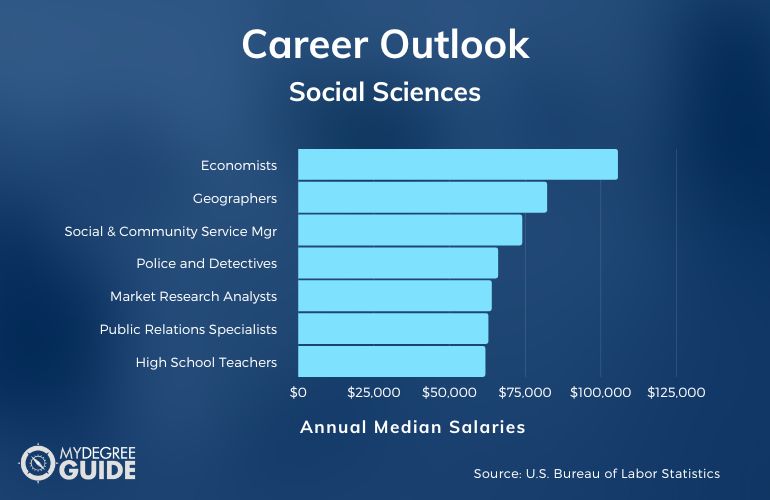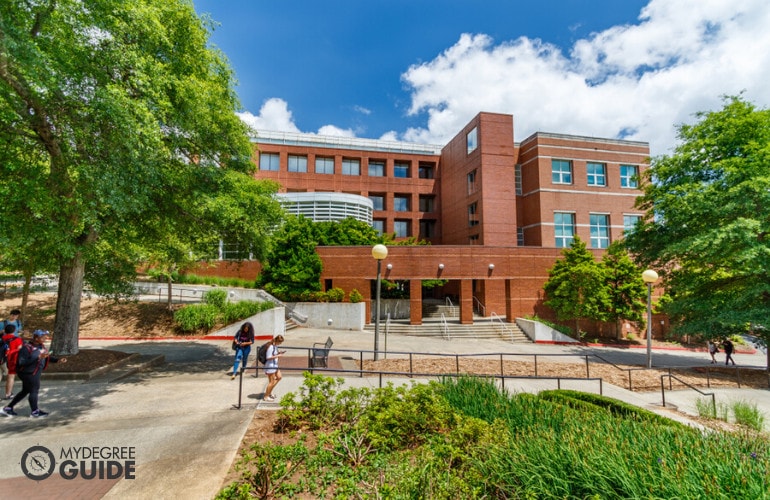A bachelor degree in social science can give you opportunities to study people, organizations, institutions, and cultures. The various branches of social science are connected by their common interest in human social structures.

A social science bachelor’s degree could lay the foundation for further studies in psychology, anthropology, history, or another discipline.
Editorial Listing ShortCode:
It could also help you get started on a professional path toward a rewarding career in research, education, or community development.
Universities Offering Online Bachelors in Social Science Degree Programs
Methodology: The following school list is in alphabetical order. To be included, a college or university must be regionally accredited and offer degree programs online or in a hybrid format.
Excelsior College
Excelsior College offers a Bachelor of Science in Social Science. Students must complete 120 credit hours with a minimum GPA of 2.0 to graduate. A concentration in Human Services may be added to the degree. Those interested in the program may apply online with official transcripts and records of previously completed exams and certifications.
Excelsior College is accredited by the Middle States Commission on Higher Education.
Kansas State University
Kansas State University offers an online Bachelor’s in Social Science program. Students must complete 120 credit hours to graduate. To be eligible for the program, applicants must have a minimum GPA of 3.25, an ACT score of 21, or an SAT score of 1060.
Kansas State University is accredited by the Higher Learning Commission.
New York University
New York University offers a Bachelor of Arts in Social Science. Students may add one of seven concentrations to their degree, such as Anthropology, History, or Media Studies. To graduate, 120 credit hours, an internship, and a capstone project must be finished. Applicants must have 45 transferable credits to be eligible for the program.
New York University is accredited by the Middle States Commission on Higher Education.
Pennsylvania State University
Pennsylvania State University offers a Bachelor of Science in Integrated Social Sciences. To graduate, students must complete 120 credit hours and a final portfolio. Those interested in the program must submit a self-reported academic record when applying. After being accepted into the school, official transcripts and SAT or ACT test scores must be submitted.
The Pennsylvania State University is accredited by the Middle States Commission on Higher Education.
Troy University
Troy University offers a Bachelor of Science in Social Science with the option to add a concentration in Geography or Leadership. To graduate, students must complete 120 credit hours. To be eligible for the program, applicants must have a minimum GPA of 2.0 and appropriate ACT or SAT test scores.
Troy University is accredited by the Southern Association of Colleges and Schools Commission on Colleges.
University of Alaska – Southeast
The University of Alaska—Southeast offers a Bachelor of Arts in Social Science. Students may add a concentration in Anthropology, History, Political Science and Government, Psychology, or Sociology. To graduate, students must complete 120 credit hours. Applicants must have a high school GPA of 3.0 or higher to be eligible for the program.
The University of Alaska – Southeast is accredited by the Northwest Commission on Colleges and Universities.
University of Central Florida
The University of Central Florida offers a Bachelor of Science in Social Sciences. Students must complete 120 credit hours, including three minors, while maintaining a GPA of 2.0 or higher to graduate. Applicants must submit an online application with self-provided academic records and standardized test scores. An application essay is not required but encouraged by the program’s admissions department.
The University of Central Florida is accredited by the Southern Association of Colleges and Schools Commission on Colleges.
University of Maryland Global Campus
The University of Maryland Global Campus offers an online program for a Bachelor of Science in Social Science. A focus in Anthropology, Gerontology, Psychology, or Sociology may be added to the degree. Students must complete 120 credit hours to graduate. Applicants must have a high school diploma or the equivalent to be eligible for the program.
The University of Maryland Global Campus is accredited by the Middle States Commission on Higher Education.
University of Washington
The University of Washington offers a Bachelor of Arts in Integrated Social Sciences. The online program requires students to complete 180 quarter credit hours to graduate. To be eligible for the program, applicants must have 75 transferable credits with a minimum GPA of 2.0.
The University of Washington is accredited by the Northwest Commission on Colleges and Universities.
Washington State University
Washington State University offers an online social science degree program. It is designed to allow students to complete 2-3 concentrations in a field of their choice. To graduate, students must complete 120 credit hours. Applicants must submit their high school transcripts or GED with their application.
WSU is accredited by the Northwest Commission on Colleges and Universities.
Bachelor Degrees in Social Science
If you’re interested in studying society, then a degree in social science might be of interest to you. Social scientists explore the cultures that humans have established as well as the ways that people groups or societal institutions interact with each other. Social science has many branches, including the five listed below.
Select the program that most interests you to jump to that section of the guide:
Regardless of the specialty you select, you will still receive a strong foundation in business administration and related courses.
Anthropology

Anthropologists study humans, both past and present. They’re interested in what sets humans apart from other creatures, and they also survey the great diversity among the various people groups on earth.
Anthropology majors may study evolutionary biology, human growth and development, and linguistics. Other course topics might include urban anthropology, ancient people groups, religion theories, and primate studies. Cultural anthropologists study people groups and their cultures, while evolutionary anthropologists explore the origins of humanity.
Editorial Listing ShortCode:
Archaeologists study historical artifacts to learn more about the societies from which they came. In general, anthropology majors may work in museums, schools, community organizations, or for the government. Those who want to become full-fledged anthropologists or archaeologists go on to earn their masters.
History

Historians study things that have happened in the past. They are intrigued by the people and events that have shaped society and led to the present day.
History majors take courses in geography, anthropology, religion, and research methods. They also study particular time periods, such as prehistory, Ancient Rome, the Middle Ages, and colonial America. Pursuing a history degree often requires selecting a specialization area. Common examples include American or European history.
Editorial Listing ShortCode:
History experts with a teaching certificate may become public school educators. Other job opportunities in this field include writer, campaign manager, advertising specialist, museum technician, and political lobbyist.
Political Science

Whether you want to study the politics of your own country or the governments of other countries, a degree in political science could be a good fit for you.
The coursework for this degree program might cover topics like comparative politics, statistics for political research, and international diplomacy. Political science students often have to take a foreign language, too. Many political science majors have a degree concentration, such as American politics or international relations.
Editorial Listing ShortCode:
Some political science graduates who want to work in government-related jobs become legislative aides or continue their education to become policy analysts. Others go into public relations or marketing careers.
Psychology

Psychology is the science that explores thoughts and behavior. Whether you’re interested in studying human cognition or helping people work through their mental health struggles, you might be interested in majoring in psychology.
For this major, you will typically study topics like personality theory, knowledge acquisition, motivation, and human development. Some courses may address specific disciplines in this field, such as child psychology or abnormal psychology.
Editorial Listing ShortCode:
A number of psychology graduates work in social services as case managers or residential supervisors. They can also assist researchers, psychiatrists, or psychologists. Those who want to become counselors continue on to graduate school.
Sociology

As a student in sociology, you can study the behavior patterns of groups and populations of people. While psychology majors usually focus on individuals’ thoughts and behaviors, sociologists look for broader trends.
Topics for a sociology program often include family dynamics, societal institutions, contemporary social issues, criminology, and health behavior. There are also classes on conducting social science research. Some students choose concentrations for their degree. The options might involve public health, social justice or criminal justice, or environmental management.
Editorial Listing ShortCode:
With a sociology bachelor’s degree, many graduates enter the social services field or work as sociology research assistants.
Social Sciences Careers & Salaries

Social science is a diverse field with a range of job opportunities. Which path you choose to follow may depend on the type of degree you earn. For example, economics majors may become economists. Many economists hold government jobs, but consulting firms, research organizations, and financial institutions also hire economists.
Political science graduates may work on campaigns or serve as legislative aides. With additional training and experience, they may become political scientists who study policies, current events, and economic developments. Graduating with a geography degree could lead to opportunities in mapmaking, regional planning, or research.
Sociology majors may become sociologists who use surveys and other research methods to study societal problems or trends. They may also become social workers who connect people in need to support services. Social science graduates of any field may do jobs related to helping people or improving communities. Leaders in such roles are often known as community or social service managers.
According to the Bureau of Labor Statistics, jobs in the life, physical and social sciences pay a median annual salary of $79,740.
| Careers | Annual Median Salaries |
| Economists | $105,630 |
| Geographers | $82,220 |
| Social and Community Service Managers | $74,000 |
| Police and Detectives | $66,020 |
| Market Research Analysts | $63,920 |
| Public Relations Specialists | $62,800 |
| High School Teachers | $61,820 |
| Social Workers | $50,390 |
| Social Science Research Assistants | $49,720 |
| Substance Abuse, Behavioral Disorder, and Mental Health Counselors | $48,520 |
Advanced roles in the social sciences often require a masters degree or higher. Having a bachelors degree may qualify you for entry-level or assistant positions in your field of choice.
Anthropology students may want to become cultural anthropologists, biological anthropologists, or archaeologists. Those professionals hold masters degrees and often work in offices, at dig sites, or at historical parks and museums. History students, too, may find museum jobs. Government organizations are some of the top employers of historians.
Those who study psychology often continue their education so that they can become psychologists. Professional psychologists may advise business leaders, counsel patients, or conduct research about human behavior.
Another option for many social science majors is to go into teaching. History and psychology are common high school courses that social science majors may be able to teach, though a state teaching license is a requirement for most teaching positions.
Bachelor in Social Sciences Curriculum & Courses

Social science students often take a variety of foundational courses from across the many branches of this discipline. After that, they advance to in-depth courses focused on their particular area of study. Here are examples of some common social science courses:
- Communication Studies: In this class, you may explore the history of language and consider different ways that people deliver messages to one another.
- Culture and Diversity: Studying multiculturalism can give you a better appreciation for people’s differences and prepare you to work in diverse or cross-cultural settings.
- Foundations of Social Science: In this introductory course, you’ll gain a broad overview of the social sciences and discuss some of the degree and career paths that are available.
- Human Development: You’ll study the human lifespan and how people develop mentally, physically, and socially over the years.
- Introduction to Psychology: This class will cover the historical theories and modern scientific understandings of people’s thought processes and behaviors.
- Law and Policy: By understanding the legalities of social science work, you may be in a better position to influence future policy changes.
- Macroeconomics: In this class, you’ll learn about large-scale economic principles and practices.
- Social Concerns: This course will look at modern societal problems and discuss common strategies for combatting these issues.
- Social Science Research Methods: You will find out about both quantitative and qualitative approaches as you learn how social scientists gather and use data.
- Statistics: A basic statistics course will be important as you learn to gather and interpret scientific data.
A social science bachelor’s degree usually requires 120 credit hours, which can generally be completed with 4 years of full-time study.
How to Choose a Bachelor Degree in Social Science Program

You can use the following considerations to figure out which schools’ social science degrees might be right for you:
- Accreditation. Regionally accredited colleges offer degree programs that you can count on for reliable career preparation.
- Class format. Some colleges have on-campus social science programs, and others offer their classes online. As far as online courses go, they may be synchronous or asynchronous.
- Licensure preparation. If you want to become a teacher or a social worker, you may want to select a program that includes the necessary coursework for certification.
- Major vs. concentration. Some colleges offer individual majors for each branch of social science. Others have a general social science program in which you can select one or more concentration tracks.
- Transfer credit. If you have previous college credit, you might benefit from a college with generous transfer policies.
Choosing a college can seem overwhelming at first, but figuring out what characteristics you’d like in a social sciences degree program can help you narrow down your options.
Bachelor of Social Science Admissions Requirements

Getting into college starts with filling out an application. You may also need to turn in some of the following materials:
- Essay about your life experiences or college goals
- School transcripts from high school and any college work you’ve done
- Scores from the ACT or SAT (not required by all schools)
- References letters from teachers or bosses
Many colleges use the Common App, which can simplify the process of completing applications for multiple schools.
Social Science Degrees Accreditation

For a degree program that helps you grow personally, academically, and professionally, it’s beneficial to choose a regionally accredited college. Schools with regional accreditation have undergone a rigorous evaluation process to ensure that they meet educational standards.
Attending an accredited school can be especially important down the line if you decide to transfer elsewhere or go to grad school. Other colleges may only accept your past work if it was completed at a regionally accredited institution. Having a degree from an accredited school may also give hiring committees confidence about your abilities and your preparation for the workforce.
Social Sciences Licensure and Certifications

Many social science jobs don’t need licenses or certifications, but some career options do have special requirements. For example, if you want to teach psychology, history, or another social science in middle or high schools, it’s often necessary to take education courses and earn a state teaching license.
You may be able to take the required classes during your bachelor’s studies or in a master’s in social science program. Some states also have licensure requirements for entry-level social workers. Plus, a masters degree and additional licensure are required to become a licensed clinical social worker (LCSW).
Financial Aid and Scholarships

It may be beneficial to check out your options for financial aid. Government help is a top source of funding for many college students, and undergraduates often get loans or grants.
Loans are money that you borrow and pay back later with interest. Grants are funds that don’t have to be repaid. You can fill out the Free Application for Federal Student Aid (FAFSA) to learn more about your federal funding options. You may qualify for state help, too.
Scholarships are another form of college money that doesn’t have to be repaid. They are sometimes given directly by colleges. Other times, they’re given by outside organizations, such as industry associations and community charities. Some employers also offer workplace help to pay for classes.
Social Science Professional Organizations

You can network with other social science students and professionals by joining an industry organization that engages in research, advocacy, education, or support. Here are some social science professional organizations:
- American Sociological Association (ASA)
- Consortium of Social Science Associations (COSSA)
- National Social Science Association (NSSA)
To share information and encourage professional growth, organizations often publish research journals or host annual conferences. Other benefits of joining a group may include online libraries, job boards, research grants, webinars, newsletters, discussion forums, and professional discounts.
Is a Social Science Degree a BA or BS?
Your college degree could be either a Bachelor of Arts in Social Sciences or a Bachelor of Science in Social Sciences.
| BA in Social Science | BS in Social Science |
|
|
Either a BA in Social Science or a BS in Social Science could lead to grad school or help you enter the workforce.
What Does a Social Science Degree Cover?
The social sciences explore the ways that people—and the systems and institutions they create—interact with one another. Social scientists gather and analyze data to draw conclusions about various aspects of society.
What your specific social science degree covers will depend on which branch of this field you study. The social sciences include anthropology, economics, philosophy, political science, and psychology. Even still, many social science majors have similar lower-division classes, such as introductory courses in psychology and sociology. There may also be a class that teaches you about research methods used by social scientists.
What Can You Do with a Social Science Degree?

Social science graduates can do a variety of entry-level jobs in their area of expertise. For example, some people work in museums as technicians or educators. Others are research assistants to sociologists, political scientists, or historians.
Having a teaching certificate opens up the possibility of teaching in public schools. Those graduates may teach middle school history or high school economics, for example. Many social science graduates go into government or community development, potentially working as social workers or legislative aides. Others work in business as marketing or public relations specialists.
With a graduate degree, some people become psychologists, economists, political scientists, historians, or anthropologists.
How Long Does It Take to Get a Bachelor’s Degree in Social Science?

Most people think of a bachelor’s degree as a 4 year program. Students can arrive on campus as freshmen, take 8 semesters of classes, and then graduate at the end of senior year. If you go to a school with traditional 16 week semesters, that might be your experience if you enroll full-time. Most colleges understand, though, that many working adults need to get through school quickly.
A growing number of schools provide fast-track online programs with short terms and year-round studies. As a result, you may be able to complete your bachelor’s degree program in less than 4 years, especially if you have previous credits to transfer. On the other hand, part-time studies can help you balance and maintain your various responsibilities, though it will often take you longer to finish your degree.
What Jobs Can You Get with a Social Science Degree?

Bachelor’s degrees in social science can lead to entry-level positions in a variety of scientific roles. Recent graduates may be assistants to anthropologists, political scientists, psychologists, or economists. According to the Bureau of Labor Statistics, social science research assistants earn a median of $49,720 each year.
Social science graduates may also work in community agencies. Options might include being a caseworker, a social worker, or a community service manager. Some social science students want to pursue teaching careers. With a state teaching license, they may teach history, economics, or psychology to teenagers.
What’s the Difference Between a Bachelor’s in Social Science vs. Social Studies Degree?
You might have taken social studies classes as a kid, and social science sounds pretty similar. Getting a B.A. in Social Science won’t be the same as rehashing your past social studies homework, though.
| Social Science | Social Studies |
|
|
While the social sciences are used in social studies, these two disciplines are not identical.
What’s the Difference Between a Humanities vs. Social Science Major?
The humanities and the social sciences are often grouped together, but there are differences between these two fields of study.
| Humanities | Social Sciences |
|
|
There is frequently overlap between these two areas, and some subjects can’t be neatly classified into one group or the other.
Is a Bachelor Degree in Social Science Worth It?

Yes, a bachelor degree in social science is worth it for many professionals. Students often find the various branches of social science fascinating because they provide opportunities to study people and cultures.
Whether you’re interested in psychology, economics, or political science, choosing to major in social science may be a good fit for you. Plus, the Bureau of Labor Statistics predicts strong job opportunities in social science fields over the next ten years. An 8% growth rate is expected for life, physical, and social science occupations, which is on par with the national average for job growth.
Getting Your Bachelors in Social Science Degree Online

Social science can be a fascinating subject for your college studies. In a social science program, you can learn about psychology, culture, economics, history, and more. The knowledge you’ll gain in your classes may apply to jobs in many different sectors, including social service, business, government, and research.
You may even be able to earn your social science degree through a distance-learning program. Online degree programs use computer-based classrooms, discussion boards, and engaging assignments to ensure that students receive a rigorous social science education. To find out more about the benefits of virtual degree programs, you can check out online social science programs from accredited schools.
The sooner you start exploring your options, the sooner you may find the online or on-campus degree program that best aligns with your interests and goals.
